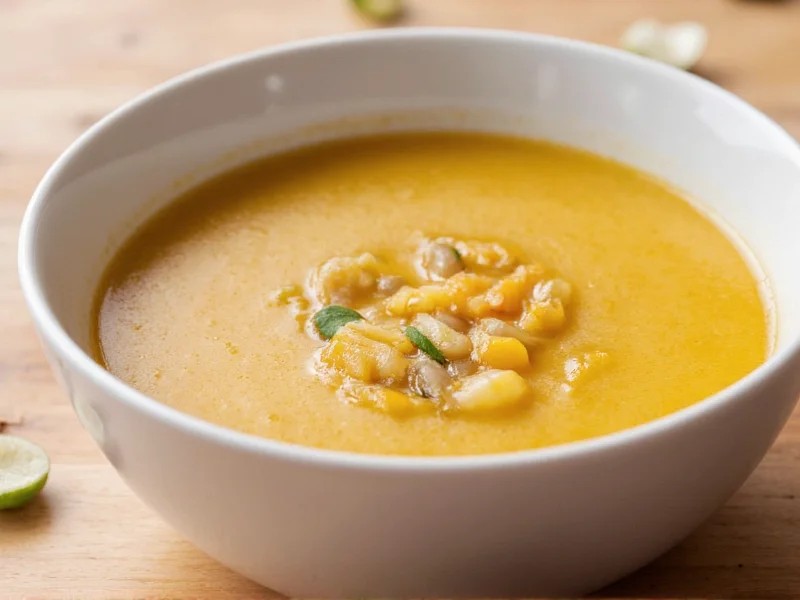The simplest authentic French onion soup recipe requires just 6 ingredients: yellow onions, butter, beef broth, baguette slices, Gruyère cheese, and a splash of sherry or brandy. Caramelize 4 lbs of thinly sliced onions slowly over 40 minutes, add 6 cups of quality beef broth, simmer for 15 minutes, then ladle into oven-safe bowls topped with toasted baguette and melted cheese. Ready in under 60 minutes with minimal active cooking time.
Why This Simple French Onion Soup Recipe Works
Many home cooks avoid French onion soup thinking it's too complex, but the magic happens through patience, not complicated techniques. This streamlined version maintains the soul-warming essence of the Parisian bistro classic while eliminating unnecessary steps. The key is understanding that true simplicity comes from respecting the fundamentals: proper onion caramelization and quality broth.
Unlike restaurant versions that might take hours, this approach delivers deep flavor in under an hour by focusing on what matters most. You'll skip the traditional wine addition (though we'll mention it as an optional variation) and use readily available ingredients without sacrificing authenticity.
Essential Ingredients Explained
The beauty of French onion soup lies in its minimal ingredient list. Each component plays a critical role:
| Ingredient | Why It Matters | Pro Tip |
|---|---|---|
| Yellow onions (4 lbs) | Develop complex sweetness when caramelized | Slice uniformly 1/8-inch thick using mandoline |
| Unsalted butter (3 tbsp) | Creates richer flavor than oil alone | Add 1 tbsp olive oil to prevent burning |
| Beef broth (6 cups) | Foundation of savory depth | Use low-sodium for better control |
| Gruyère cheese (1.5 cups) | Melts perfectly with nutty flavor | Shred yourself for best melting |
| Baguette (8 slices) | Traditional base for cheese topping | Toast slices before adding to soup |
Step-by-Step Preparation
Follow these straightforward steps for foolproof French onion soup every time:
Onion Caramelization (40 minutes)
- Peel and thinly slice 4 pounds of yellow onions
- Melt butter with olive oil in a large Dutch oven over medium heat
- Add onions and stir to coat evenly with fat
- Cook uncovered, stirring every 5-7 minutes
- After 20 minutes, sprinkle with 1 teaspoon sugar to accelerate browning
- Continue cooking until onions reach deep golden brown (not blackened)
- Stir in 2 tablespoons all-purpose flour and cook 2 minutes
Soup Assembly (15 minutes)
- Pour in 6 cups beef broth, scraping up any browned bits
- Add 1/4 cup sherry or brandy (optional but recommended)
- Season with 1 teaspoon thyme, salt and pepper to taste
- Simmer uncovered for 15 minutes to meld flavors
- Preheat broiler with oven rack in top position
Finishing Touches (5 minutes)
- Ladle hot soup into oven-safe crocks
- Float 1-2 toasted baguette slices on each serving
- Cover bread generously with shredded Gruyère
- Broach 2-3 minutes until cheese bubbles and browns
- Let rest 2 minutes before serving (soup will be extremely hot)
Avoiding Common French Onion Soup Mistakes
Even simple recipes can go wrong without proper technique. These pitfalls sabotage many homemade French onion soups:
- Rushing caramelization - Onions need full 40 minutes to develop proper sweetness without burning. Never crank the heat to speed this up.
- Using pre-shredded cheese - Anti-caking agents prevent proper melting. Always shred Gruyère yourself from a block.
- Skipping the flour - A quick roux creates body without making the soup starchy or heavy.
- Overfilling bowls - Leave 1-inch space below rim to prevent spills when adding toppings.
- Serving immediately after broiling - The soup needs 2 minutes to settle or it will bubble over.
Variations for Different Dietary Needs
This basic French onion soup recipe adapts well to various preferences:
- Vegetarian version: Substitute quality mushroom or vegetable broth and add 1 tablespoon soy sauce for umami depth
- Gluten-free option: Omit flour or use 1 tablespoon cornstarch mixed with 2 tablespoons cold broth
- Wine-enhanced: Add 1/2 cup dry white wine after onions caramelize, cooking until fully evaporated
- Quick version: Use 2 lbs fresh onions plus 1 cup onion jam to accelerate caramelization
Serving and Storage Tips
French onion soup performs best when served immediately after broiling, but you can prepare components ahead:
- Caramelized onions keep refrigerated for 3 days or frozen for 3 months
- Assemble soup in crocks but wait to add bread and cheese until ready to serve
- Reheat gently on stove (not microwave) to preserve texture
- Never freeze soup with bread and cheese topping already added
- Pair with simple green salad for complete meal
Why This Recipe Stands Out Among Simple French Onion Soup Recipes
Most "easy" French onion soup recipes cut corners that destroy authenticity. They might use onion soup mix, skip proper caramelization, or rely on broiler-safe bowls that can't handle the temperature shock. This method respects the dish's French heritage while making it accessible for weeknight cooking.
The secret to our simple French onion soup recipe without wine (though wine is optional) is understanding that time, not complexity, creates flavor. By dedicating proper attention to the onion caramelization phase—the true foundation of the dish—you build depth that no shortcut can replicate. This approach delivers restaurant-quality results without requiring professional equipment or techniques.











 浙公网安备
33010002000092号
浙公网安备
33010002000092号 浙B2-20120091-4
浙B2-20120091-4